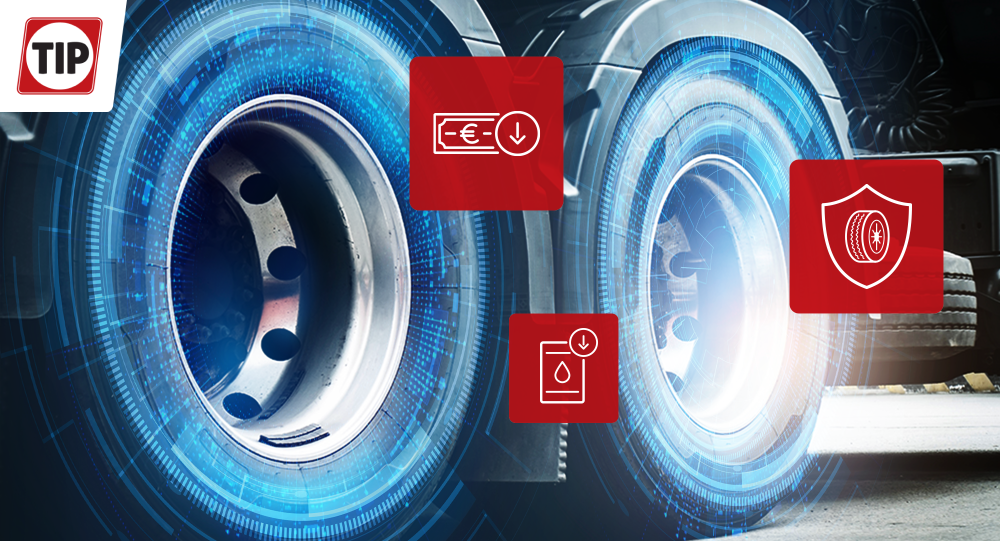TPMS: the pressure is now on to ensure your trailer fleet complies with the new EU legislation!
Maintaining correct tyre pressures is essential to ensure safe driving of a vehicle. It can also make a positive difference to your total cost of trailer management by extending tyre lives, reducing fuel consumption, improving handling and road safety and reducing trailer downtime. Therefore, it is essential to anticipate and detect an anomaly in time to stay roadworthy.
The requirement for a TPMS (Tyre Pressure Monitoring System) to commercial trailers and semi-trailers is stipulated in the Regulation 2009/661, as part of the UN ECE R141 (EU’s new Global Safety Regulations).
All trailer type approvals issued after 6th July 2022 will now need to have TPMS installed to comply with the R141 regulation. In a longer-term, all new registered trailers must also be installed with TPMS from 7th July 2024, to be fully compliant.
This new legislation will have a significant impact on how a trailer fleet is managed going forward into the future!
Why is TPMS so important?
Even now, it’s estimated that a substantial number of commercial vehicles hit the road each day with underinflated tyres. However, proper tyre maintenance with the aid of a TPMS can, and does, help prevent many serious accidents.
TPMS can also help reduce the total cost of tyre and overall fleet management by enabling:
- Greater safety – Using a TPMS to monitor and correct the pressure in the trailer tyres will improve the safety and handling of trucks and trailers, making life safer for drivers and other road users
- Reduced total cost of trailer management - TPMS is a valuable tool for keeping a trailer fleet tyres in good condition and thereby minimising unwanted trailer downtime
- Reduced fuel consumption – Correctly inflated tyres give superior fuel consumption
- Longer tyre life - Maintaining the correct tyre pressures can prolong the lives of your tyres
Quite simply, traditional manual tyre inspections are, and will continue to be, a must for every operator. However, an effective TPMS makes it even easier for all concerned, by letting the driver know immediately when there’s a problem.
Operators who use TPMS to ensure that the trailer fleet tyre pressures are at the proper levels will enjoy numerous long-term tangible benefits.
Correct tyre pressure inflation will optimise the tyre's surface contact throughout its performance. As a result, this in turn will optimise the tyre's traction, ensure a shortened braking distance, improve the fuel economy, and ensure a slower and even wear along the whole tread area.
Without doubt, when a TMPS system is installed on a trailer and performs in the proper manner, it will contribute to the trailer’s long term optimal performance.
How does a TPMS work?
TPMS are installed inside of each wheel, either when the truck/trailer is manufactured or retrofitted after the vehicle is operational. It is a system fitted to a truck or trailer, which constantly monitors the pressures or pressure imbalance in the tyres and provides a warning to the driver if these fall below a certain threshold, possibly creating unsafe driving conditions.

Two types of TPMS systems are popular in heavy goods vehicles today:
- Direct systems - these use radio sensors mounted inside of each wheel to measure the tyre inflation pressures – they ‘directly’ measure the pressure within each tyre and send the data to a control unit
- Indirect systems - these utilise the vehicle’s existing ABS sensors to measure and compare the rotational speeds of the tyres and vibrations to ‘indirectly’ calculate the pressure within the tyres
Although the methods may be different, both types of system work with the vehicle’s main Electronic Control Unit (ECU) and activating the same indicator light to alert the driver in real time to any pressure loss or variance issues.
Take the pressure off your trailer fleet with TIP
At TIP, our understanding of tyre management is immense. Annually, our 3,000 experts across Europe and Canada inspect more than 1,700,000 tyres.
Based on this knowledge and proven expertise, TIP has now added TyrePlus TPMS sensors to its TIP Insight's suite of full-fledged telematics solutions. TyrePlus provides tyre pressure temperature data to improve early leakage detection, support enhanced vehicle maintenance and increase uptime.
Fleet operators access TyrePlus TPMS data online and in real time in TIP’s FleetConnected platform. Here, they can not only check tyre status and history, but also set up alarms and analytical reports. To further maintain the roadworthiness of a trailer, TIP also provides an uninterrupted service desk approach with emergency failure prevention in less than 45 minutes.
TyrePlus has been designed to work with all types of trailer and be user-friendly for fleet managers, allowing them to take quick decisions when a tyre needs attention or be replaced. It delivers the data directly to the fleet depots where they can schedule the right maintenance in the appropriate timeframe.
For more information on TIP’s innovative TPMS, please take a look at the TyrePlus section of our website.













